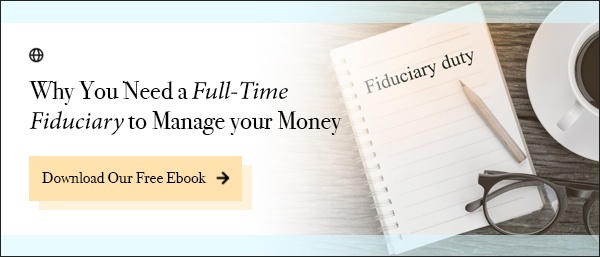Global View Investment Blog
‘Free’ Stock Trades – Is This a Free Lunch?
In Short
It’s finally happened. Trading stocks is finally “free.” After one discount brokerage firm made the announcement, we can expect the rest to follow. They do this because they lure in unsuspecting customers with “free.”
Let me translate what “free” means to you, as an investor. Free means there are other hidden costs you don’t see. There's no such thing as a free lunch. You will pay in other ways that are not transparent.
Brokerage firms make most of their money in ways you never knew. They have hidden revenue-sharing agreements. They make money by paying low interest on deposits and charging higher rates or margin. They profit from the difference (or spread) between the ask and sell prices of stocks. More insidious, they can direct the flow (for cash) of your stock trades. The buyers of the "flow" then make profits on the spread.
The direct cost of free trades is simple. Because transaction costs appear to have dropped, investors will trade more often. More frequent trading means lower returns. Two studies show that investors who trade more often lose between 3 and 7 percent per year in returns.
This is only one way investors lose. And it’s why they need an advocate. With the unwinding of the Department of Labor Fiduciary Rule (DOL rule) the industry will get even more confusing. Because firms are back to their old ways. The only question is what will you do about it?
More Detail
A large discount brokerage dropped the price to sell and buy stocks to zero. Others followed. A rational investor might ask, how can they do that? The answer is simple. They do it because they know most investors won't notice they are paying more in other ways.
Your mother told you to watch out when someone offers you something for free. Sure, if it's family, a church member or a neighbor, it might be genuine. But businesses don't stay in business by giving things away.
Robinhood is a popular discount brokerage that charges no commissions. Instead of making a commission, they are paid in "order flow." Order flow is routing their customers transactions to electronic trading firms. The electronic trading firms can further steer the flow of orders so other firms can profit. The profit comes from the spread between the asking price and selling price. The result is that buyers pay more when they buy. And sellers get less when they sell. To compensate the originating firm, the online trading firms pay the brokerage firms. This is a practice pioneered by Bernie Madoff. But what, me worry?
(Learn more about revenue sharing and other conflicts of interest.)
Because everyone wants free, this is dangerous. If you talk to your accountant, your accountant knows he or she can quantify how much you have to pay. Your accountant’s job will always be to reduce your taxes. But that's not always the right thing. The right thing is to help you have more money, even if you must pay more taxes!
But investors love free. They love index funds with very low costs. They love free stuff like iPads. Because they love free, they embrace indexing and Do It Yourself investing.
My question is: Does it make sense? Or is it your "chimp" making decisions because it's emotionally appealing? There are 5 key ways investors sabotage themselves. You take too much risk because you don’t know how much risk you're taking. You pay a high fee for something that is not real, like a guarantee you'll never use. You're unwilling to take pain today to avoid a greater pain tomorrow. You remember your wins and forget your losses, making you believe you're a great investor. Finally, because you are such a great investor, you think you can make the other decisions on your own. Even when they are important decisions you may only make one-time: Like when you will retire, when you sell a business or how you structure assets to maximize benefits to heirs.
Where Successful Investors Focus
Successful investors retire with the income they want. They aren’t afraid of running out of money. They don’t obsess about predicting the next recession, or whether which political candidate will end the world. They teach their children to handle money and they make sure they organize their affairs so that their intentions go on after they aren’t here. They don’t pay unnecessary taxes, but they don’t avoid paying taxes when it makes sense either.
Successful investors aren’t worried about free stock trades. When they do trade, it’s rarely. As Warren Buffet said, “If you don’t feel comfortable holding a stock for 10 years, you shouldn’t own it for 10 minutes.” Sure, they don’t want to pay expensive commissions, but for clients in our stock portfolios who average 10 or so trades a year, the “savings” (assuming the bid-ask spreads don’t widen so there are no actual savings, which I expect to be true) are around $50 a year.
(Read the most common questions our richest clients ask.)
The worst thing about all of this is it’s not free. More frequent trading lowers returns. As Benjamin Graham put it, “The investor’s chief problem – and even his worst enemy – is likely to be himself.” The trading records of 10,000 investors over a seven-year period showed the following:
- Stocks investors bought underperformed the stocks they sold
- Investors paid small commissions but also bid-ask spreads (adding to the cost, even if the commissions had been zero)
- The overall difference between those bought and sold was 3 percent, which means investors lost 3 percent per year from trading
- Another study of 66,000 investors showed active investors lost 6 to 7 percent per year to buy and hold investors
Replace Concern with Confidence
As my business partner Adam Wiles wrote, replacing concern with confidence eliminates unnecessary worry. We put the work into the purchase. Then we watch it like a hawk and sell only if we lose faith.
(Should you be a Do It Yourself investor?)
An ever-prudent investor is interested in valuation. Even in an environment where most stocks are overvalued and bonds are unnecessarily risky, there is a lot of opportunity. This opportunity manifests in discrepancies in valuations. According to Chuck de Lardemelle at IVA, the last year or two has created “extreme discrepancies in valuations.” Companies like BMW trade at 3 times earnings before interest and taxes in contrast to Mastercard, trading at 30. At that level of valuation, BMW could lose half its earnings in a terrible recession and still be worth its price today!
We’re invested in opportunity. Even if it doesn’t look like it in the short-term.
This will always be true.

Written by Ken Moore
Ken’s focus is on investment strategy, research and analysis as well as financial planning strategy. Ken plays the lead role of our team identifying investments that fit the philosophy of the Global View approach. He is a strict adherent to Margin of Safety investment principles and has a strong belief in the power of business cycles. On a personal note, Ken was born in 1964 in Lexington Virginia, has been married since 1991. Immediately before locating to Greenville in 1997, Ken lived in New York City.
Are you on track for the future you want?
Schedule a free, no-strings-attached portfolio review today.
Talk With Us






